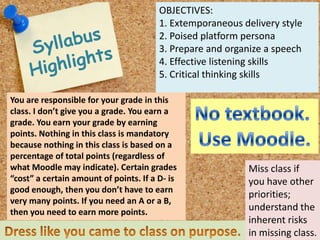This document provides guidance for students taking a public speaking class. It outlines 5 objectives for the class, including extemporaneous delivery, poised platform presence, speech preparation and organization, effective listening, and critical thinking. It notes that grades are earned based on points from assignments, and missing class carries inherent risks. Several upcoming assignments are then outlined, including introductory speeches, chapter speeches on various topics, and exercises in visualization, plagiarism, research sources, outlining and formatting outlines. An upcoming class schedule is provided, noting upcoming deadlines and evaluations. In summary, the document provides an overview of assignments, objectives, and expectations for a public speaking course.






















![Build A Speech
•
•
•
•
•
Select a topic
Analyze the audience
Develop a specific purpose
Select a structural pattern
Form[at] an outline](https://image.slidesharecdn.com/basicoralcommunicationlectures-131030131003-phpapp01/85/Basic-Oral-Communication-Lectures-23-320.jpg)





![Outline Form[at]s
• Formal (written delivery)
– Details
– Sentences
– Parallelism
• Planning (approval/draft)
– Details … or not
– Sentences … or not
– Parallelism … or not](https://image.slidesharecdn.com/basicoralcommunicationlectures-131030131003-phpapp01/85/Basic-Oral-Communication-Lectures-29-320.jpg)
![Outline Form[at]s
(cont.)
• Keyword (oral delivery)
– No Details
– Simple Phrases/Key-words
– Parallelism … or not](https://image.slidesharecdn.com/basicoralcommunicationlectures-131030131003-phpapp01/85/Basic-Oral-Communication-Lectures-30-320.jpg)

































